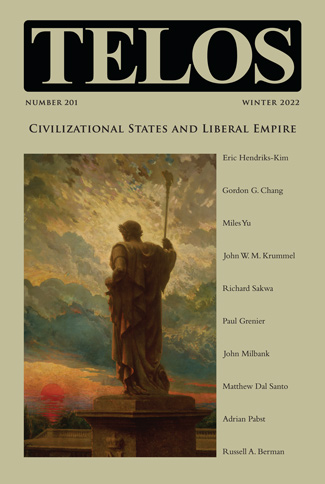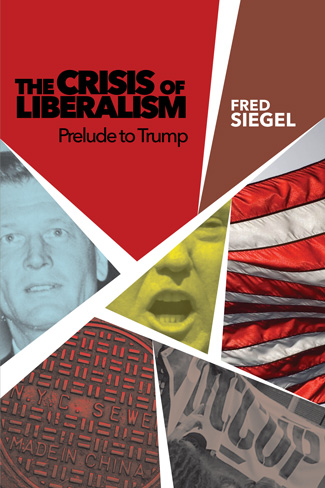In today’s episode of the Telos Press Podcast, David Pan talks with John Milbank about his article “A Tale of Two Monsters and Four Elements: Variations of Carl Schmitt and the Current Global Crisis,” from Telos 201 (Winter 2022). An excerpt of the article appears here. In their conversation they discuss the three idioms into which Milbank divides Carl Schmitt’s thought; why they should be seen as separate idioms rather than different aspects of a single perspective; the extent of overlap between the idioms; whether the decisionist Schmitt is as arbitrary as he is made out to be; the characteristics of a medieval European conception of nomos that Schmitt wishes to retrieve; the similarities between Schmitt’s third idiom of global regions and both Nazism and Russian theorists like Gumilev, Panarin, and Dugin; Schmitt’s decisionism, basic values, identity, and thinking through popular sovereignty. If your university has an online subscription to Telos, you can read the full article at the Telos Online website. For non-subscribers, learn how your university can begin a subscription to Telos at our library recommendation page. Print copies of Telos 201 are available for purchase in our online store.
|
Telos 201 (Winter 2022): Civilizational States and Liberal Empire is now available for purchase in our store. Individual subscriptions to Telos are also available in both print and online formats.
When we consider the way in which power functions on a global level, it will also be crucial to understand how a world order will reflect a particular way of structuring the relationship between values and power. Even the seemingly most egregious use of power can only take place within the framework of an attempt to realize values in the world, and realist accounts of global order must also recognize the importance of some ideology such as nationalism as a means of establishing political values. Accordingly, discussions of balance-of-power dynamics can only begin once great powers emerge as a consequence of the political will of certain peoples to understand themselves in a certain way. Based on such measures as GDP, population, and military spending, Russia does not rank particularly well in relation to countries such as Brazil and India, neither of which pretends to great power status. If Russia can be considered a great power today, it is primarily because of the goals and values that its government embodies. Values form the foundations of global order, and Russia only continues to project its power because it maintains a sense of the global reach of its values for determining order for others. “The Russian invasion of Ukraine has put an end to the globalization we have experienced over the last three decades,” wrote Larry Fink in his March 24 letter to BlackRock shareholders. “We had already seen connectivity between nations, companies, and even people strained by two years of the pandemic.” Fink, who oversees $10 trillion of wealth as the world’s largest asset manager, is right to be concerned that an era has ended. “Globalization—as promoted by the United States over the past 70 years—has led to the greatest reduction in poverty and the biggest decline in interstate conflict in human history,” writes Matthew Rooney of the George W. Bush Institute. So will the world, in Fink’s new era, be less prosperous and peaceful? Many think high levels of trade—in other words, continued interdependence—will save the day, yet this view is debatable. “Does trade increase or decrease the likelihood of conflict?” Samuel Huntington, the late Harvard political scientist, asked in The Clash of Civilizations and the Remaking of World Order, his landmark 1996 book. “The assumption that it reduces the probability of war between nations is, at a minimum, not proven, and much evidence exists to the contrary.” Huntington, building on the work of others, pointed out that it is expectation that drives events. “Economic interdependence fosters peace,” he wrote, “only ‘when states expect that high trade levels will continue into the foreseeable future.'” So what is happening in the post-invasion period? The World Trade Organization in April predicted that merchandise trade would grow 3.0% this year—down from a previous forecast of 4.7%—but admitted growth could be as low as 0.5%. Last year’s trade volume—the WTO put total merchandise trade at a staggering $22.4 trillion after growth of 9.8%—set a record, but that figure could decline this year. Last year’s volume was the result of a sugar high, boosted by one-time government stimulus measures. Resulting commodity price increases further inflated trade statistics. The factors driving trade in 2021, the U.N. Conference on Trade and Development correctly stated in February, will “abate.” Projections of increasing trade depend on forecasts of continuing prosperity. There is concern, however, that a downturn is coming and it will be especially severe. “You’d better brace yourself,” Jamie Dimon, the influential CEO of JPMorgan Chase, told a financial conference in New York in early June. He said everyone should expect not “storm clouds”—his previous prediction—but a “hurricane,” which could be “a minor one or Superstorm Sandy.” To read more in depth from Telos, subscribe to the journal here. On February 2, the second day of Black History Month, a tweet from a Black woman in the United States unleashed a war of words in India, with global resonance. Rihanna, the Barbados-born U.S. singer, entrepreneur, philanthropist, and cultural activist posted a one-liner: “why aren’t we talking about this?!” with the hashtag #FarmersProtest and a link to a report about the government of India shutting down internet services in areas bordering the national capital, New Delhi, where farmers have been carrying out a movement to oppose three contentious farm laws. Rihanna’s tweet went viral. The climate activist Greta Thunberg, Hollywood actor John Cusack, U.S.-based lawyer and supporter of Black Lives Matter Meena Harris, former adult star Mia Khalifa, Instagram influencer Amanda Cerny, R&B singer Jay Sean, and music composer Dr. Zeus all expressed support for the Indian farmers’ protests in their own independent tweets. Kisan Ekta Morcha, the official twitter account of the United Farmers’ Front, thanked Rihanna for her support of the movement, and countless Indians praised her for drawing international attention to the movement. Nietzsche once said that culture was only a thin apple peel over a glowing hot chaos. That is probably to say that even a small shock suffices to confront us anew with barbarism and dizzying stupidity. And now we are actually dealing with a worldwide pandemic. In effect, the thin apple peel tore at once and an abyss of the most dangerous folly has opened up. Thus one headline read in the weekly newspaper Die Zeit: “Mankind takes a break—the planet exhales.” One might simply accept as childish impudence calling the lockdown, the curfew that has practically brought the entire global society to a standstill, a “break.” But the madness lies in the presumptuousness of assuming a perspective above humans and of making oneself the voice of the “tortured” earth. Giovanni di Lorenzo, an intelligent, educated man, is the editor-in-chief of that newspaper. But today he evokes Hermann Melville’s captain Benito Cereno: The barbarians have his ship in their hands—and he can do nothing about it. Now available from Telos Press Publishing: The Crisis of Liberalism: Prelude to Trump, by Fred Siegel. Order your copy today in our online store and save 20% off the list price. Also available in Kindle ebook format.
by Fred Siegel In The Crisis of Liberalism: Prelude to Trump, Fred Siegel leverages New York City to uncover the key political conflicts and social contradictions in American liberalism over the last century. This wide-ranging collection of essays critically recounts how passionate intellectual debates over how to realize “the good life” in the modern city emerged from the writings of early progressive “thought leaders,” who envisioned a new educated elite capable of enlightened democratic governance. The flaws in this approach, as Siegel shows, expressed themselves most floridly in John Lindsay’s New York, whose flashy limousine liberals were a preview of today’s politically correct gentry liberalism. Its cultural programs over the past half-century repeatedly failed the downtrodden underclass and alienated middle-class New Yorkers trapped in economic stagnation. By neglecting voters’ real concerns over illegal immigration and China’s emerging threats, globalist technocratic liberals ultimately set the stage for Donald Trump’s angry nationalist demand to put “America First.” |
||||
|
Telos Press Publishing · PO Box 811 · Candor, NY 13743 · Phone: 212-228-6479 Privacy Policy · Data Protection Copyright © 2025 Telos Press Publishing · All Rights Reserved |
||||




